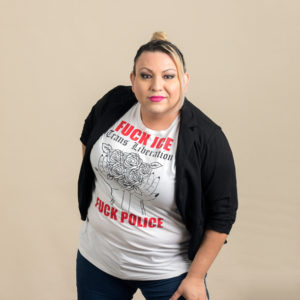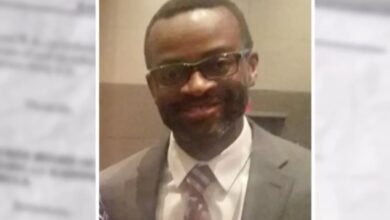
Local Trans Women of Color are 2019 Pride Honorary Marshals
Their selection honors the 50th anniversary of the Stonewall Rebellion.

 This year’s honorary Pride marshals are four Houston trans women of color who have been making a difference in the lives of other local trans women of color: Ana Andrea Molina, Atlantis Narcisse, Dee Dee Watters, and Monica Roberts. By choosing to honor these four Houstonians, the committee of former Pride marshals pays tribute to the trans women of color who are credited with initiating the Stonewall Inn civil-rights rebellion in 1969: Marsha P. Johnson, Sylvia Rivera, and Stormé DeLarverie. This year’s “Summer of ’69” Pride theme looks back 50 years to three seminal events from the 1960s—Stonewall, the NASA moon landing, and Woodstock.
This year’s honorary Pride marshals are four Houston trans women of color who have been making a difference in the lives of other local trans women of color: Ana Andrea Molina, Atlantis Narcisse, Dee Dee Watters, and Monica Roberts. By choosing to honor these four Houstonians, the committee of former Pride marshals pays tribute to the trans women of color who are credited with initiating the Stonewall Inn civil-rights rebellion in 1969: Marsha P. Johnson, Sylvia Rivera, and Stormé DeLarverie. This year’s “Summer of ’69” Pride theme looks back 50 years to three seminal events from the 1960s—Stonewall, the NASA moon landing, and Woodstock.

Ana Andrea Molina
Ana Andrea Molina remembers feeling different by age 5, relating more to feminine personality traits. She especially enjoyed imitating the great Latina singers who made her feel the intensity of their passion. One day, Molina’s mother discovered that Molina was dressed in her sister’s clothes, and hit her. Molina went to church every Sunday to ask God for forgiveness.
Then at age 18, after two suicide attempts, Molina left the closet. She had given up asking God to change her, and wondered if there was a pill that could do the job. Talking with her mother did not resolve the issue, so Molina left home.
Molina says that she grew up thinking of trans women as sex workers. Alone and without a job, she learned how to work the streets. “Life was very hard, and that is why many of us talk about the [desperate situations] from which we came,” she says. But neither the danger nor the violence could stop her, now that she had found her true self.
In 2015, tired of racism and transphobia, she organized, Organización Latina de Trans en Texas (OLTT), a non-profit empowerment and leadership group for Latinas. She expected 15 women at the first meeting, but 50 showed up.
In 2017, Molina traveled to Austin to fight against SB6 (the “bathroom bill”) and SB4 (the bill banning sanctuary cities in Texas). She introduced herself to the legislators as “an undocumented transgender immigrant woman.”
Also that year, Molina secured funding to establish Casa Anandrea, the first safe-space for trans, queer, and intersex people of color. “It is a shelter for homeless people who would otherwise be on the streets or living with domestic violence—regardless of immigration status, race, language, or HIV status. It is an inclusive space, receiving those who need it.” The refuge is still open, and although Molina says that resources are running low, she refuses to accept “closed” as an option.
Molina says, “This house has served refugees emigrating from their countries who are released from Immigration and Customs Enforcement detention centers.” She has helped 21 trans women of color coming out of the detention centers, and has worked with 16 others to legally change their name and gender markers, all at no cost to them.
Molina believes that local law-enforcement officers contribute to the system of oppression that criminalizes and deports undocumented persons. “The community should not forget that the system of oppression works in many ways, including [against] members of our community.”
Of her selection as an honorary marshal, Molina says, “I feel proud and privileged that after 50 years, trans women of color are back in front of the march for pride! I am continuing to follow their legacy.”
Molina’s message to trans youth of color: “History continues to be written, so be a part of it and write the chapter that corresponds to your history. Do not be afraid—you have nothing to lose, and much to win. Do not be afraid of success. If Sylvia and Marsha and Ana Andrea could do it, then you can also do it.”

Atlantis Narcisse
“I didn’t know for the longest time that I was trans,” Atlantis Narcisse admits. “I knew merely that I was a woman. During my upbringing, trans was not a word that was used throughout my community—we were women. As persons of color and trans, we conformed and blended into society as much as we could, because of stigma and for safety.”
Coming out as trans was a bit different for Narcisse. “I was also raising a son, and I didn’t want anything about me to subject my child to being bullied or teased.” Then one day her son asked her, “When are you going to be happy?” During that conversation, we agreed that once he had graduated from high school, I would transition into my life.”
Narcisse is a mentor to countless trans people. She works at the Montrose Center, helping trans people navigate available resources and services and learn how to advocate for themselves. She has a personal mission to help trans people get their legal names and gender markers changed. She has formed Save Our Sisters United to provide a safe space for trans women of color and assist them without stigma or judgment.
Reflecting on her selection as an honorary marshal, Narcisse says, “It’s kind of surreal, but I think it is exactly what is needed in society, as well as throughout our diverse LGBTQ+ communities. I am sure it will hit me more when the parade occurs, but to celebrate the trans pioneers that played major parts in the whole gay movement, [beginning] at Stonewall, sends a bigger message than we could ever truly measure.“
Her message to trans youth of color is: “You alone own your visibility, and should never feel bad about simply wanting to live and enjoy life.”

Dee Dee Watters
Dee Dee Watters knew she was trans at a young age, but didn’t know what to call it. When she finally heard the word “trans” in high school, it made sense to her. She came out at 16.
Watters has been very involved in Houston’s LGBTQ community. She has participated in the annual Transgender Day of Resources and Healthy Living and on multiple conference discussion panels. She also works to create more spaces for trans women of color.
Regarding her selection as an honorary Pride marshal, Watters says, “It’s absolutely amazing. I never thought I’d have the honor of being an honorary grand marshal. I’m pleased and excited—just wait until you see me at the parade!”
Watters has this message for trans youth of color: “As you navigate through life, be true to yourself and know that sometimes in life you have to go through something in order to get somewhere! The important thing is knowing where you’re going.”

Monica Roberts
Monica Roberts says that by age 5 she realized she was “different,” but didn’t attach a name to it until the much-publicized transition of transgender tennis player Renée Richards in 1976.
In April 1994, Roberts transitioned. She was working as a Continental Airlines gate agent at the time, and after preliminary counseling at the Rosenberg Clinic in Galveston, she came to work presenting as a female for the first time. Roberts recalls the drama that ensued during that first week: “It took years to pass. And right-wing women tried to get me banned from the women’s bathroom, but failed.” Two more airline employees transitioned after seeing her lead the way.
Roberts says she had no intention of becoming an activist until a local organization published a series of articles about 100 out and proud trans people in 1997. Frustrated that the series failed to include a single African-American trans female, Roberts went to the next Gender Pac Lobby Day in June 1998 and quickly become involved in trans advocacy with the help of activists Phyllis Frye and Sarah de Palma, who mentored and inspired her. In 1999, she had her name changed and also worked to include trans people in the Matthew Shepard and James Byrd Jr. Hate Crimes Prevention Act.
For most of the 2000s, Roberts lived in Louisville, Kentucky, working with their local equality campaign and serving on the board of Southern Comfort, the largest trans conference in the country. She returned to Houston in 2010, and within a week was attending the Texas Transgender Nondiscrimination Summit at Rice University.
Roberts formed a national coalition to take on the Human Rights Campaign (HRC) in the days before that group officially advocated for including trans people in the (still unpassed) federal Employment Non-Discrimination Act (ENDA). In 2007, she was part of a trans lobbying day at the Capitol in Washington D.C. that included a meeting with then-senator Barack Obama. “I believe that is why he was able to understand trans issues so well,” she says.
Roberts co-chaired the Creating Change Conference held in Houston in 2014, which is still the group’s best-attended conference. Roberts recalls receiving a shout-out from trans actress Laverne Cox during her keynote speech.
Roberts says her proudest moment was helping pass HERO (the Houston Equal Rights Ordinance) in 2015. She was also asked to join Mayor Turner’s LGBTQ Advisory Board that year.
In 2006, Roberts founded the popular web blog TransGriot, which she is proud to say has been active for “13 years and counting.” She is the winner of the 2018 GLAAD (Gay and Lesbian Alliance Against Defamation) media award for Outstanding Blog after being nominated four times for the award.
She is also the recipient of numerous local and national human-rights awards. As for her selection as one of the four honorary Pride marshals, Roberts says, “I feel honored to be selected. The four of us combined are doing a lot of work in different lanes.”
Roberts would like to tell trans youth of color that “black trans people are also black people. You don’t turn in your black card when you identify as trans. Know that you are loved, wanted, needed, and necessary. We need people to speak truth to power on a wide range of issues. Lobby and educate—make clear that we are part of the diverse mosaic of life, and that you will be respected.”
This article appears in the June 2019 edition of OutSmart magazine.











Comments